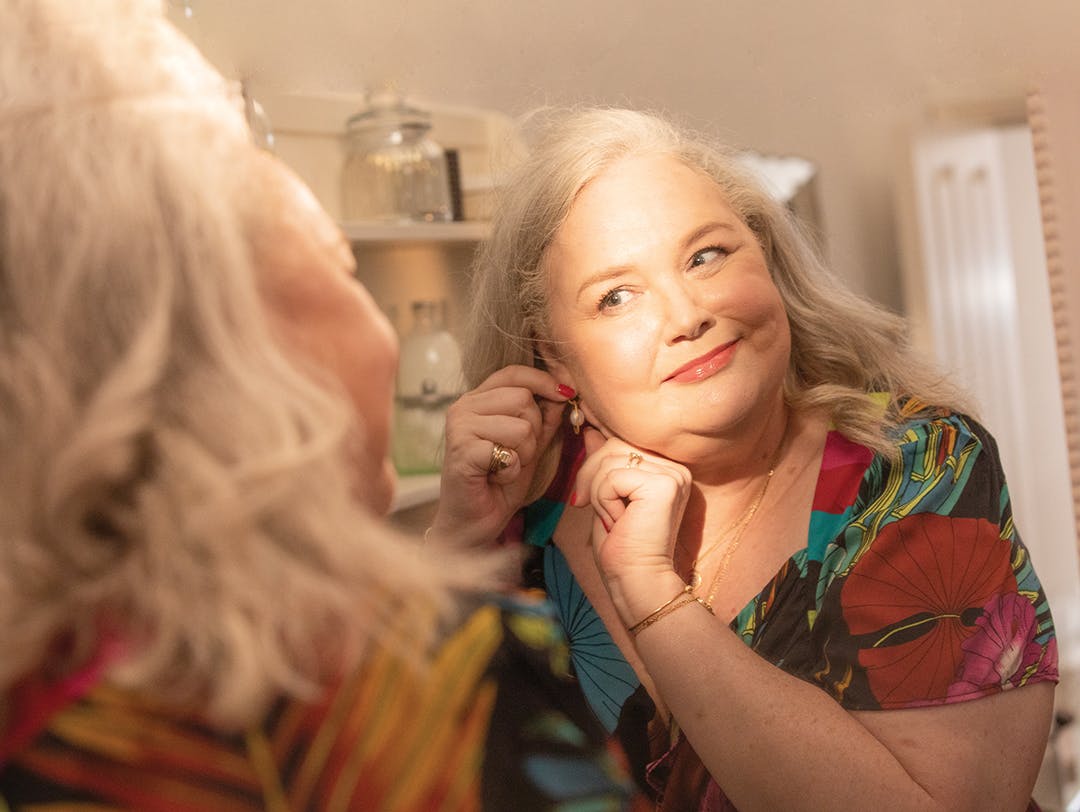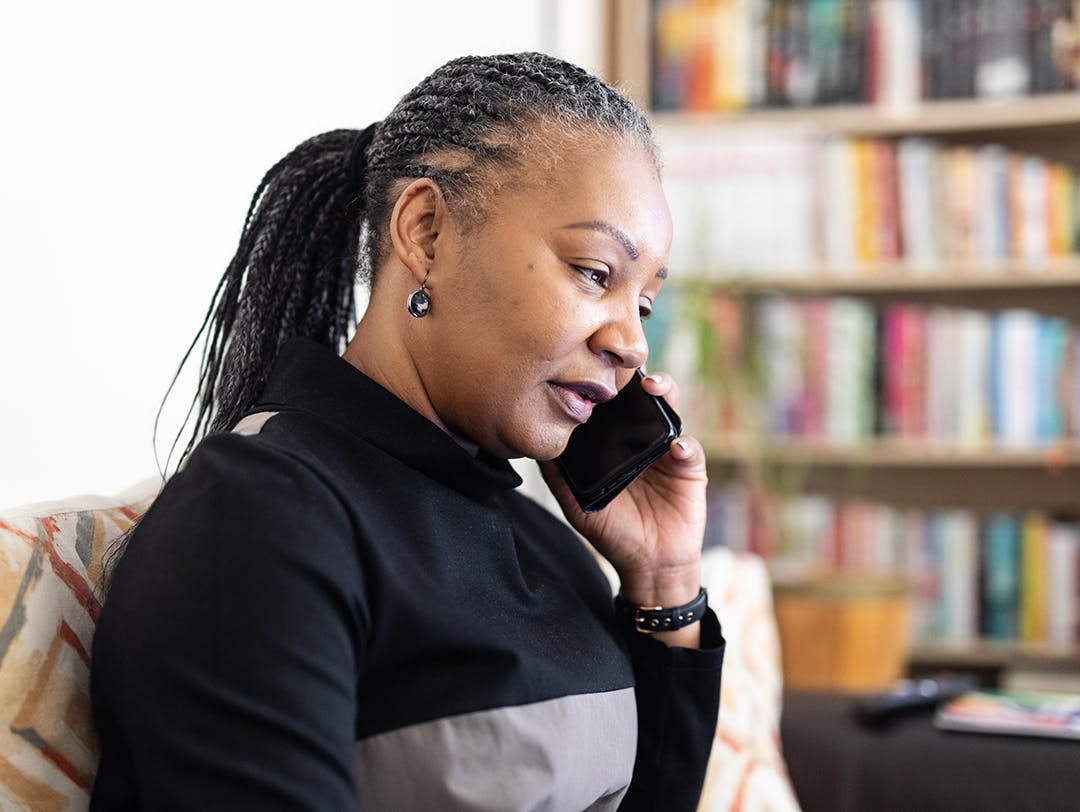CHOOSING TO SHARE YOUR HIV STATUS
Choosing to tell someone that you’re living with HIV can feel like a big step. You never know how they might react and that can be challenging.
It’s important to know there is no right or wrong way to do it. Take your time and make sure you’re ready, and remember, if you never feel ready that’s ok too. The decision to share your status should always be your choice and your choice alone.
Explore the tabs on the left to find more support and advice for whenever you choose to tell others about your positive status.
TALKING TO OTHERS ABOUT HIV
Click through the tips below to discover useful advice from people who’ve been there.
Telling others: Tom’s story
Speaking from his own experience, Tom offers advice on how to disclose your HIV status to others and the importance of talking to the right people.
Telling others: Romy’s story
After diagnosis, fear played a large role in Romy’s life. But, with the support of her therapist, she built the confidence to share her status with her father and others.
Telling others: Angelina’s story
Telling people about your HIV status can be a huge relief, but it’s okay to wait and only let others know once you are ready.
NP-GBL-HVU-WCNT-210089 | May 2023
CHOOSING NOT TO SHARE YOUR STATUS
Sharing your status can be an incredibly empowering experience that can make living with HIV a little easier – but it’s not always a simple decision to make.1
Telling others you’re living with HIV is also referred to as ‘disclosure’ or
‘disclosing your status’.1 There are plenty of reasons why you may not
feel comfortable or wish to discuss your status with others, and that’s ok.
It’s private information and it’s your right to wait until you are completely
ready to share your status with anyone – even if that person is your best
friend, partner, a family member or employer.1
When making the decision not to share your status there are some things
to keep in mind.
Choosing not to share your status
In this short video, Susan and Bakita provide some facts about sharing your status and discuss those times when they have decided not to share theirs.
Do I have to tell other people?
It’s up to you to decide when you’re ready to talk about your HIV with others. You should never feel rushed or pressured into it – take your time if you need to.1
Understanding that Undetectable = Untransmittable (U=U) has helped many people living with HIV feel more confident about their status.2 Being ‘undetectable’ means that your HIV medication is keeping your viral load so low that HIV can not be detected in blood tests or passed on via sex.2 Having this knowledge can help conversations with other people about HIV and give them an understanding of what it means to live with HIV today.
Keep things discreet
There may be times when you are worried your status could be ‘discovered’ when you’d prefer to keep it private. It’s perfectly normal to feel this way.
It’s important that you never feel forced into a situation where you status is shared without your permission. To help, here are some tips about maintaining discretion.
What should I do if I think I have been discriminated against?
If you feel you have been forced into sharing your status or have been discriminated against at work, in a healthcare setting or individually, there are community resources that can help you. Connecting with your local HIV group is a good first step. They can put you in touch with legal specialists, counsellors and members of the HIV community who can support and advise you.11
NP-GBL-HVU-WCNT-220013 | May 2023
HIV STIGMA AND DISCRIMINATION IN HEALTHCARE
Looking after your health and wellbeing is an important part of living well with HIV.
From time to time, you may need to access other healthcare services for medical reasons that are not related to your HIV, such as your dentist or GP.

Sharing your status with healthcare professionals could be important for your health. For example, letting your GP know what HIV medication you take can help them avoid any potential interactions between the drugs they prescribe and your current HIV treatment. You should always feel comfortable discussing your health needs and should not be treated differently because of your HIV status.
Unfortunately, some people living with HIV do still experience stigma and discrimination from healthcare professionals. This can have a lasting impact. It can affect the way people feel about themselves and their HIV, and can put them off seeking medical help. As well as facing stigma, some people have to educate their healthcare professionals about HIV. This can lead to negative conversations and relationships, even if they aren’t discriminatory in a 'typical' way.
No matter your experiences, the type of stigma, or the reasons for it, the HIV community is here to support, empower and advise you – and this includes your HIV healthcare team. Reach out to your healthcare team or local community groups to find people living with HIV in your area.
NP-GBL-HVU-WCNT-220014 | October 2023


WHAT'S NEXT?
There was a time when HIV care focused solely on suppressing the virus. As HIV care has evolved, ensuring a good quality of life for people living with HIV is now just as important as effective HIV treatment and care.
Having a long, healthy life should be achievable for most people living with HIV today.22 This may mean that your health and treatment needs change over time.
- Avert. Sharing your status. Available at: https://www.beintheknow.org/living-hiv/understanding-and-sharing-your-hiv-status/sharing-your-status. [Accessed January 2023].
- Avert. What is an undetectable viral load? Available at: https://www.beintheknow.org/living-hiv/hiv-treatment/how-hiv-treatment-works. [Accessed January 2023].
- Avert. Sharing your status with a partner. Available at: https://www.beintheknow.org/living-with-hiv/understanding-and-sharing-your-hiv-status/sharing-your-status-partner. [Accessed January 2023].
- National Aids Trust. Your voice. A guide to disclosure. Available at: https://www.nat.org.uk/sites/default/files/publications/YourVoice.pdf. [Accessed January 2023].
- HIV.gov. Talking about your HIV status. Available at: https://www.hiv.gov/hiv-basics/hiv-testing/just-diagnosed-whats-next/talking-about-your-hiv-status. [Accessed January 2023].
- HIV.gov. HIV treatment as prevention. Available at: https://www.hiv.gov/tasp. [Accessed January 2023].
- NAM Aidsmap. Do you have to disclose your HIV status to an employer? Available at: https://www.aidsmap.com/about-hiv/do-you-have-disclose-your-hiv-status-employer. [Accessed January 2023].
- NAM Aidsmap. Telling healthcare workers you are living with HIV. Available at: https://www.aidsmap.com/about-hiv/telling-healthcare-workers-you-are-living-hiv. [Accessed January 2023].
- Terrence Higgins Trust. Travelling with HIV medication. Available at: https://www.tht.org.uk/hiv-and-sexual-health/living-well-hiv/your-rights/travelling-hiv/travelling-hiv-medication. [Accessed January 2023].
- British HIV Association (BHIVA). Travelling with medication: statement from British HIV Association (BHIVA) and National AIDS Trust (NAT). Available at: https://www.bhiva.org/travelling-with-medication-statement-from-BHIVA-and-NAT. [Accessed January 2023].
- National Aids Trust. Your rights. A guide to human rights and HIV. Available at: https://www.nat.org.uk/sites/default/files/publications/YourRights.pdf. [Accessed January 2023].
- Murungi A, et al. Experience of living with HIV: Diagnosis & Disclosure – findings from the Positive Perspectives study. Presented at the IAS Conference on HIV Science (IAS 2017), 23 26 July 2017, Paris, France. Available at: https://www.natap.org/2017/IAS/IAS_69.htm. [Accessed January 2023].
- ViiV Healthcare. The Positive Perspectives Survey Report. A view into the lives of people living with HIV. Available at: https://edgesuite.gskstatic.com/Viiv/viivhealthcare/pdf_files/master/main/positive-perspectives-survey-report-finalcompressed.pdf. [Accessed January 2023].
- UNAIDs. Evidence for eliminating HIV-related stigma and discrimination. Available at: https://www.unaids.org/sites/default/files/media_asset/eliminating-discrimination-guidance_en.pdf. [Accessed January 2023].
- National Health Service. HIV and AIDS. Available from: https://www.nhs.uk/conditions/hiv-and-aids/. [Accessed January 2023].
- NAM AIDSMAP. How likely is mother-to-child transmission of HIV? Available at: https://www.aidsmap.com/about-hiv/how-likely-mother-child-transmission-hiv. [Accessed January 2023].
- NAM AIDSMAP. What is discrimination? Available at: https://www.aidsmap.com/about-hiv/what-discrimination. [Accessed January 2023].
- Academic Medical Education. ViiV Symposium: 4 Women: 4 Seasons of Stigma. Available at: https://academicmedicaleducation.com/meeting/international-workshop-hiv-women-2022/video/viiv-symposium-4-women-4-seasons-stigma. [Accessed January 2023].
- UNAIDs. Confronting discrimination. Available at: https://www.unaids.org/sites/default/files/media_asset/confronting-discrimination_en.pdf. [Accessed January 2023].
- National Aids Trust. Real stories. Available at: https://www.nat.org.uk/dermatologist-discriminating. [Accessed January 2023].
- UNAIDs. HIV and stigma and discrimination. Available at: https://www.unaids.org/sites/default/files/media_asset/07-hiv-human-rights-factsheet-stigma-discrmination_en.pdf. [Accessed January 2023].
- Avert. How HIV treatment works. Available at: https://www.beintheknow.org/living-hiv/hiv-treatment/how-hiv-treatment-works. [Accessed January 2023].
NP-GBL-HVU-WCNT-210084 | May 2023
If you get any side effects, talk to your doctor, pharmacist, or nurse. This includes any possible side effects not listed in the package leaflet. You can also report side effects directly via the GSK Reporting Tool link https://gsk.public.reportum.com/. By reporting side effects, you can help provide more information on the safety of this medicine.
If you are from outside the UK, you can report adverse events to GSK/ ViiV by selecting your region and market, here.






